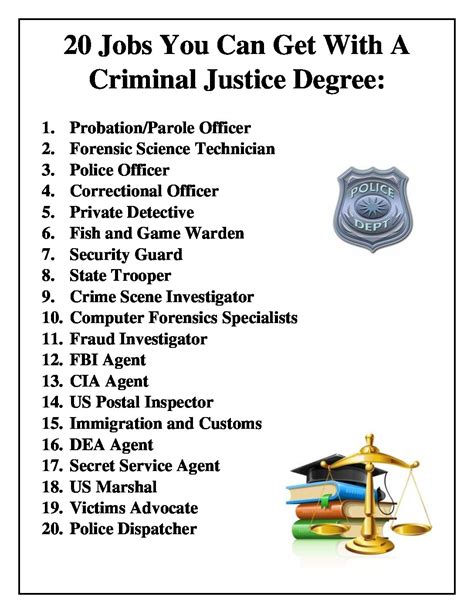A criminal justice degree can lead to a wide range of fascinating and fulfilling careers in the field of criminal justice and beyond. With a comprehensive understanding of the principles and practices of criminal law, criminology, and the criminal justice system, graduates of criminal justice programs are well-prepared to serve in various roles that contribute to ensuring public safety and administering justice.

Job Prospects and Career Advancement
The job outlook for criminal justice professionals is promising, with projected growth in various fields. According to the U.S. Bureau of Labor Statistics (BLS), the demand for law enforcement officers is expected to increase by 5% between 2021 and 2031, adding about 26,200 new jobs. Correctional officers and jailers are also in high demand, with a projected increase of 4% and 6%, respectively, during the same period.
Moreover, criminal justice graduates are well-suited for roles in homeland security, the intelligence community, the judicial system, victim support organizations, and social services. With their knowledge of criminal behavior, law enforcement procedures, and social justice issues, they can contribute significantly to these fields.
Career Options with a Criminal Justice Degree
1. Law Enforcement
- Police Officer: Uphold the law, respond to emergencies, conduct investigations, and maintain public order.
- Sheriff’s Deputy: Serve as law enforcement officers in rural areas, performing duties similar to police officers.
- Correctional Officer: Supervise and manage inmates in jails and prisons, ensuring their safety and security.
- Park Ranger: Enforce laws in national parks and protect natural resources.
2. Homeland Security
- Transportation Security Officer (TSA): Screen passengers and their belongings for potential threats at airports and other transportation hubs.
- Border Patrol Agent: Protect the United States’ borders from illegal entry, smuggling, and terrorism.
- Immigration Officer: Enforce immigration laws and regulate the movement of people across the border.
- Intelligence Analyst: Collect and analyze information to identify potential threats to national security.
3. Judicial System
- Paralegal: Provide legal assistance to attorneys, prepare legal documents, and conduct research.
- Court Reporter: Transcribe court proceedings and provide official records of trials.
- Probation Officer: Supervise and support individuals convicted of crimes while they are on probation.
- Victim Advocate: Provide emotional support and assistance to victims of crime.
4. Social Services
- Social Worker: Help individuals and families overcome social challenges, such as poverty, mental illness, and addiction.
- Substance Abuse Counselor: Provide therapy and support to individuals struggling with substance use disorders.
- Mental Health Counselor: Address mental health issues and provide counseling to individuals and families.
- Victim Services Specialist: Assist victims of crime by providing resources, advocacy, and support.
5. Other Careers
- Private Investigator: Conduct investigations for individuals, businesses, and law firms.
- Loss Prevention Officer: Prevent and investigate loss and theft in retail and commercial establishments.
- Security Guard: Provide security for businesses, residential areas, and special events.
- Cybersecurity Analyst: Protect computer systems and data from cyberattacks and security breaches.
Benefits of a Criminal Justice Degree
- In-Demand Careers: Criminal justice graduates are in high demand in a variety of fields.
- Job Security: Many careers in criminal justice offer stable employment with benefits.
- Making a Difference: Criminal justice professionals play a vital role in upholding the law and ensuring public safety.
- Diverse Career Options: A criminal justice degree opens doors to a wide range of careers, both within and outside of the criminal justice field.
- Strong Earning Potential: Salaries for criminal justice professionals vary depending on experience and role, but many earn salaries that are above the national average.
Considerations for Choosing a Criminal Justice Degree
- Interest: Pursuing a criminal justice degree should be driven by a genuine interest in the field.
- Aptitude: Individuals who are analytical, problem-solvers, and have strong communication skills are well-suited for criminal justice careers.
- Education Requirements: Most entry-level criminal justice jobs require at least a bachelor’s degree in criminal justice or a related field.
- Continuing Education: To advance in their careers, criminal justice professionals often pursue graduate degrees or specialized training.
FAQs
1. What is the difference between a criminal justice degree and a criminology degree?
A criminal justice degree focuses on the practical aspects of law enforcement, corrections, and the criminal justice system, while a criminology degree emphasizes the study of crime and criminal behavior.
2. What are the most common career paths for criminal justice graduates?
Common career paths for criminal justice graduates include police officer, correctional officer, probation officer, and victim advocate.
3. Is a criminal justice degree a good return on investment?
Yes, a criminal justice degree can provide a good return on investment, as it prepares graduates for in-demand careers with stable employment and good earning potential.
4. What is the average salary for criminal justice professionals?
According to the BLS, the median annual salary for police officers was $67,290 in May 2021, for correctional officers $47,690, and for probation officers $56,220.
5. What are the benefits of working in the criminal justice field?
Benefits of working in the criminal justice field include job security, the opportunity to make a difference, and the potential for career advancement.
6. What are the challenges of working in the criminal justice field?
Challenges of working in the criminal justice field include exposure to dangerous situations, irregular hours, and dealing with difficult individuals.
7. What are some unconventional career paths for criminal justice graduates?
Some unconventional career paths for criminal justice graduates include cybersecurity analyst, private investigator, and intelligence analyst.
8. What are some tips for succeeding in a criminal justice career?
Tips for succeeding in a criminal justice career include maintaining physical fitness, continuing education, and networking with other professionals in the field.
